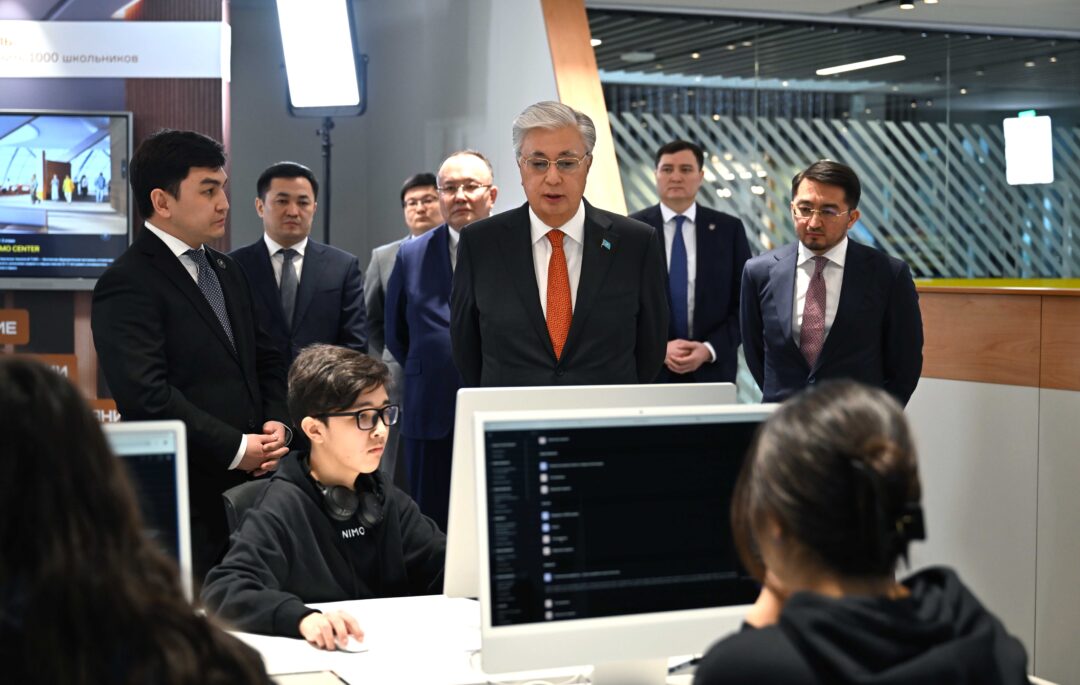ASTANA — Kazakh President Kassym-Jomart Tokayev visited the Astana Hub innovation ecosystem on Dec. 11 to learn more about the concept of the Alem.AI Artificial Intelligence Center, which will be located in the Nur Alem sphere (an iconic architectural landmark, originally built as the centerpiece of Expo 2017), and discuss priority tasks for the country’s digital development.

Kassym-Jomart Tokayev was presented with information about promising domestic startup projects and companies participating in incubation and acceleration programs. Photo credit: Akorda
According to the Minister of Digital Development, Innovation and Aerospace Industry Zhaslan Madiyev, Tomorrow School and Tumo Education will open at the center. The center is planned to educate more than 1,000 pupils in programming, robotics, and other creative technologies and train 1,000 highly skilled experts each year. The Alem.AI international center will also serve as a campus for startup acceleration and promote research projects in this area.
Domestic advances in AI
Tokayev was presented with information about promising domestic startup projects and companies participating in incubation and acceleration programs.
Among them are Cybernet.ai, a business specializing in developing and implementing voice robots for client interaction, and ArlanBiotech, which intends to contribute to solving complex problems in immunotherapy and diagnostics. Another promising startup, Higgsfield AI, has created an advanced system that helps scientists and engineers train complex computer models.
The activities of TikTok and Netracker in Kazakhstan were also highlighted. Owing to tax preferences, visa support and other favorable conditions, foreign companies and IT specialists are becoming part of the Astana Hub ecosystem. Negotiations are underway to host offices of Telegram, TON, Tether, Google, EPAM and other global IT industry representatives to implement research projects and develop new products.
Domestic AI developments include industrial solutions such as a digital twin of fields, drone control, and a robot dog for production.
Tokayev was shown how artificial intelligence technologies are used to provide public services, as well as the capabilities of the AITU ecosystem and projects from Nazarbayev University’s Institute of Smart Systems and Artificial Intelligence (ISSAI), such as the first Kazakh language model KazLLM and the multifunctional Soyle App application.
AI development in Kazakhstan
Tokayev shared his vision of AI development in Kazakhstan and noted the country’s enormous potential in the IT sector.
“Today, the entire world is digital. According to experts, the effectiveness of artificial intelligence technology will grow every year. Therefore, we face an ambitious task to make Kazakhstan’s largest digital hub in Eurasia. It is necessary to take a fresh look at digital development,” Tokayev stated.
He reiterated the initiative to create a National Center for Artificial Intelligence. He proposed expanding this idea to make the center worldwide, transforming it into a significant institute for the development of artificial intelligence in the area.
“The Alem.AI International Center should become the epicenter of the AI movement and a symbol of the digital transformation of Kazakhstan. This platform will unite the best minds of Kazakhstan and attract talents from all over the world. Research and development laboratories, a programming school and offices of international technology companies will be located here. Astana Hub and Alem.AI should become a true innovation factory, attracting foreign partners, promoting scientific research, and developing solutions for key sectors of the business, education, and the social sphere,” he said.
Tokayev instructed to create the Council for the Development of Artificial Intelligence 2024-2029 with the involvement of leading international experts and urged the importance of approaching the legislative work thoroughly, as neural networks not only offer significant prospects but also pose serious risks and threats.
“For example, high-quality fakes are now being created to spread false information and manipulate public opinion. It is necessary to legislatively enshrine the principles of responsible use of artificial intelligence, ethical aspects, and ensure transparency and openness in its development and application,” he said.
AI infrastructure
Tokayev discussed the development of the industry’s infrastructure. He believes that AI technologies require modern computing power.
“Today, the global market is experiencing an acute shortage of computing resources, which will only increase in the near future. I instruct the government to create the necessary conditions aimed at attracting large international companies to build data centers, as well as implementing global cybersecurity standards and improving the qualifications of specialists,” said Tokayev.
Another essential task outlined in the speech was high-quality digitalization and data simplification. The government was instructed to establish data sets from which the state, businesses, and AI enthusiasts may design, train, and develop artificial intelligence models.
“An example of an integrated approach in this area is the national language model KazLLM. We taught artificial intelligence to think, analyze and speak Kazakh. This significant achievement opens up new prospects for the development of the Kazakh language in the digital environment. It is important to continue the great work that has begun. It is necessary to create a Multimodal Language Model of the Kazakh language, which will be able to simultaneously use various types of data,” he said.
AI training
As Tokayev said, the goal of training 1 million workers in AI capabilities in five years demands particular attention. Programs for schools, students, government employees, and businesses should receive the most assistance possible.
Tokayev highlighted the importance of AI education and instructed the government to implement the AI-Sana program to train specialists. He emphasized building a dynamic ecosystem integrating education, research, and startups, drawing on the expertise of leading global universities, and promoting AI’s benefits to Kazakhstan’s citizens.
“Kazakhstan has all the opportunities to take a leading position in the field of innovation and advanced technologies. Digitalization and widespread implementation of artificial intelligence should become the key to the progress of our country. I am convinced that we can achieve this ambitious goal,” Tokayev noted.
